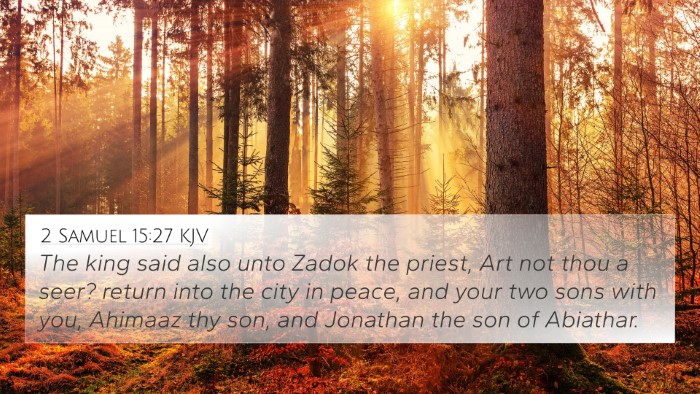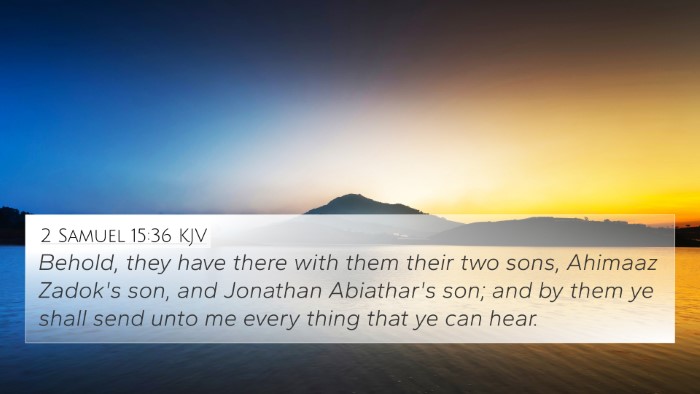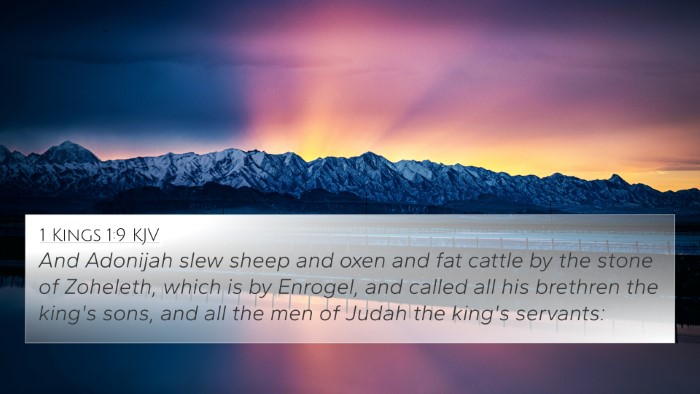Understanding 2 Samuel 17:17
2 Samuel 17:17 narrates a crucial moment during Absalom's rebellion against his father, David, highlighting themes of loyalty, divine providence, and the complexities of human relationships amid conflict.
Verse Context
This verse occurs in the backdrop of Absalom's rebellion, where Ahithophel, a counselor to Absalom, suggests a strategy to defeat David. In response, David's loyal friend Hushai offers counter-advice, showcasing the interplay between divine guidance and human decision-making.
Verse Details
The verse states: "Now Jonathan and Ahimelech were staying at En Rogel; and a maidservant went and told them, and they went and told King David." This highlights the covert communication and the risks taken by those loyal to David during turbulent times.
Commentary Insights
- Matthew Henry: He emphasizes the loyalty of Jonathan and Ahimelech, interpreting their actions as a model of faithfulness amidst danger. Henry notes that their willingness to inform David of Absalom's plans demonstrates a commitment to God's anointed king, reinforcing the biblical principle that divine favor rests on the faithful.
- Albert Barnes: Barnes points out that the use of a maidservant to relay crucial information illustrates God's providence in preserving David's life. He discusses the significance of Erogol as a place of refuge and the role of ordinary individuals in the unfolding of divine plans.
- Adam Clarke: Clarke delves into the historical and geographical aspects of the verse, highlighting how the locations mentioned played a role in the events of the rebellion. He also notes the bravery of the informants and the implications of their actions in preserving the Davidic line and foreshadowing the coming of Christ.
Thematic Connections
2 Samuel 17:17 can be linked to various themes in Scripture, including:
- The nature of loyalty and faithfulness (1 Samuel 20:8)
- The consequences of rebellion against God’s chosen leader (2 Samuel 15:10)
- Divine providence through unexpected means (Esther 4:14)
- The role of informants in biblical narratives (1 Samuel 19:18-19)
- Signals of God’s protection over His anointed (Psalm 91:15)
- Human intervention in fulfilling divine plans (Proverbs 21:1)
- The complexity of family loyalties and rivalries (Matthew 10:36)
Cross-References
To deepen your study, consider these cross-references that relate to 2 Samuel 17:17:
- 1 Samuel 20:8 - David’s covenant with Jonathan about loyalty.
- 2 Samuel 15:10 - Absalom's deceit and attempts to overthrow David.
- 1 Kings 1:26 - The loyalty of Abiathar and the priestly families.
- Esther 4:14 - God's providence working through human actions.
- Psalm 59:11 - A prayer for protection from enemies.
- Matthew 5:10 - Blessed are those who are persecuted for righteousness' sake.
- Romans 12:19 - Leaving vengeance to God, the ultimate authority.
- 2 Timothy 4:17 - The Lord standing with us in times of trial.
- Hebrews 11:32-34 - The faithful women who aided God’s people.
- James 1:12 - The blessing of enduring trials from temptations.
Conclusion
In summary, 2 Samuel 17:17 presents key spiritual lessons and practical insights about loyalty, the risks of faithfulness, and the intricate ways God orchestrates events in favor of His chosen leaders. The connections between various Bible verses enhance our understanding of this narrative, notably illustrating the importance of cross-referencing biblical texts for a comprehensive view of Scriptural themes.
The study of inter-biblical dialogue opens up avenues for deeper reflection on how contemporary Christian practice can draw upon these timeless truths.
Further Reflection
When engaging with this verse and its interpretations, readers are encouraged to explore:
- How do the themes of loyalty and divine providence resonate in your life?
- What parallels can you draw between David's struggles and your own experiences of conflict and loyalty?
- In what ways does understanding this verse aid in comprehending God's overarching narrative throughout Scripture?








